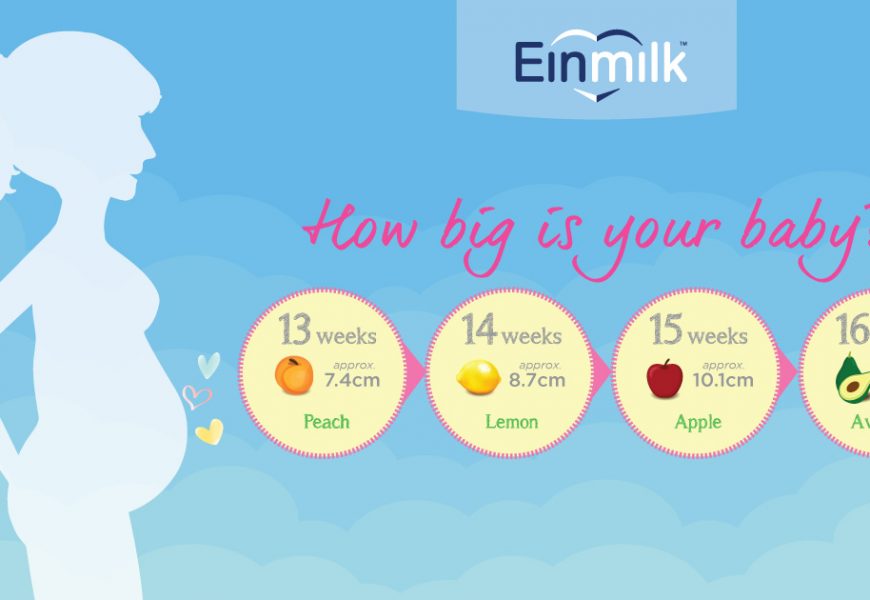Of the three trimesters, the second trimester is said to be the most comfortable and easiest as most nasty symptoms such as nausea and fatigue begin to ease off.
If that doesn’t happen to you, unfortunately you could be one of the few women whose symptoms continue through the fourth and fifth months, or even until delivery.
Let’s see what lies ahead in the second trimester!

The second trimester is when most pregnancy symptoms from the first trimester disappear and the pregnancy is considered stable.
Week 13: Peach
At around the 13th week of pregnancy, your baby’s intestines and vocal cords are developing. From a space in the umbilical cord, the intestines are now making their way into the abdomen. At this young developing stage, some foetuses can even bring their thumb to their mouths!
In the second trimester, you may experience an increase in sex drive and we encourage you to embrace it – sex is a healthy way for couples to maintain intimacy and bond and it will not harm the foetus which is safe in the womb.
To support your growing placenta and foetus, it is imperative that you tweak your diet to include essential nutrients for pregnant mothers. Including more colours in your meal is one way to absorb a wide variety of nutrients.
Week 14: Lemon
By around week 14, your baby’s intestines start to produce meconium, the black, sticky substance that will be your baby’s first poo. Baby’s digestive system is beginning to develop as well.
Hair starts to sprout on your baby’s body. His or her body will be covered with lanugo, a coating of hair that provides warmth to your baby. This lanugo will shed over time as your baby accumulates fat that will take over this function. Some babies, especially premature ones, are delivered with lanugo that will disappear soon after birth.
At week 14, the baby bump won’t be too big that it obstructs physical activity. In fact, with the increased energy, you can safely continue whatever exercise that you used to do before pregnancy. You could also start some simple exercises at home to stay fit and active even when you are pregnant. Just be sure not to overexert yourself. Your immune system will be weakened as your body does so to prevent your foetus from being rejected by your body. Be sure to load up on vitamins and maintain proper hygiene.
 Keeping yourself active during pregnancy helps to increase blood flow and keeps you active with your baby bump
Keeping yourself active during pregnancy helps to increase blood flow and keeps you active with your baby bump
Week 15: Apple
A foetus at week 15 looks a lot like an actual baby rather than an embryo. Your baby’s ears are now at the sides and the eyes are gradually moving towards the centre. While you might not be able to feel it yet, your foetus is busy practising for life in the world after birth. Your baby is working on the required skills in the comfy confines of your womb, such as breathing, sucking and swallowing, kicking and moving about.
For yourself, the disappearance of morning sickness and increased appetite could result in heartburn or indigestion, which is what happens when too much food is consumed at one time. If this happens to you, try having smaller, frequent snacks about five to six times a day instead of three large meals. This could alleviate pregnancy heartburn.
Do you find yourself becoming more and more forgetful? Thanks to “pregnancy brain”, the loss of brain cells during pregnancy which makes you forget details. Make use of your smartphone to record important information and alerts.
Week 16: Avocado
By week 16, your gynaecologist should be able to distinguish your baby’s gender, but depending on who your gynaecologist is, you may not be able to know until the 22nd week scan, unless you’ve taken the Harmony test in the first trimester.
At 16 weeks, you could be experiencing backaches, larger breasts, constipation and dry or itchy eyes. There is one positive symptom though – your skin starts glowing, and that’s the “pregnancy glow” that everyone talks about!
The tiny bones in your foetus’s ears have started to form and this is when your foetus can hear your voice from inside the womb. Studies have shown that babies after birth recognise sounds and songs that were sung to them in the womb!
What were some of the pregnancy symptoms you encountered during weeks 13 to 16? Let us know in the comments!

